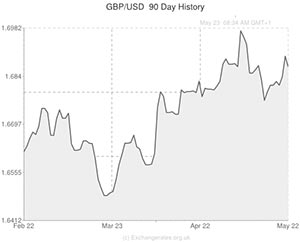
The Pound slipped to a session low against the US Dollar and softened against the Euro after some investors were disappointed by UK GDP and public sector borrowing data.
Economists had been hoping that today’s GDP data would be revised higher than the 0.8% seen in initial estimates.
According to the Office for National Statistics consumer growth in the first quarter increased by 0.8%, a tenth consecutive increase and added 0.5% to the nation’s GDP. Overall the UK economy grew by 0.8% in the first quarter, a figure unchanged from the ONS’s initial estimate.
Economic growth was aided by a sharp rise in U.K. business spending in the first three-months of the year, as business investment surged by 2.7% quarter-on-quarter, the highest rise seen since the first quarter of 2013.
Household spending rose by 0.8% quarter-on-quarter, while government spending rose by just 0.1% as it continued to tighten its purse strings.
The data now shows that the UK economy is just 0.6% off from its pre-crisis peak.
Despite the positive GDP data investors were somewhat surprised by the separate public sector borrowing data.
According to the report released by the ONS showed that public sector net borrowing was £7.364 billion, up from the £5.648 billion seen in the previous year. Economists had been expecting a figure of £4.5 billion.
“While a second estimate of UK’s GDP printed in line with expectations this morning, it was weak public sector borrowing data that took markets by surprise,” said a foreign exchange specialist.
The Pound also softened against the Euro after the single currency found support from data which showed that the recovery in the Eurozone’s services sector continued in May.
The sector expanded at its fastest pace in three years.
GBP, USD and Euro Update – 23/05/14
The Pound edged higher against the Euro on Friday after data showed that business sentiment in the Eurozone’s largest economy fell in May.
According to the Ifo Institute, its German business climate index fell from the 111.2 recorded in April to 110.4 n May.
The data came in below economist expectations for a figure of 110.9.
The single currency is also under pressure from the risks involved regarding the ongoing European elections.
Anti-EU parties are expected to do well in the vote as disenfranchised European citizens punish the established parties for their handling of the Euro crisis.
Support for the mainstream parties is expected to fall to 65% from 72%.
Against the US Dollar Sterling eased slightly following yesterdays positive US existing home sales data.

Comments are closed.